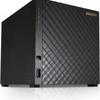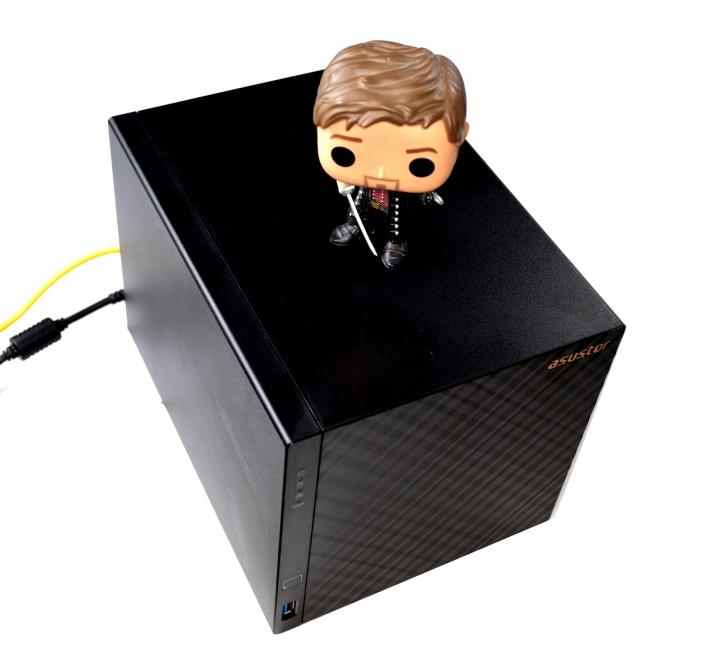Introduction
Asustor AS1104T 4 bay NAS
Today's review is of the Asustor AS1104T 4 bay network-attached storage device(NAS). This is one of the more reasonably priced versions available from Asustor. Previously, we had the Pro model (AS3304T) available for viewing on our website. What exactly are the distinctions? The main differences were the use of 1 GB DDR4 instead of 2 GB DDR4 (both of which were not extendable), the use of two USB 3.2 Gen1 connections instead of three, and the (slightly) thinner chassis. So, what are the things that they have in common? In addition to the four HDD/SSD trays, the Realtek RTD1296 processor, a quad-core with rates in the 1.0 GHz range and the ability to turbo up to 1.4 GHz, is also included in the package.The Pro model (AS3304T) was already presented on our website. What are the differences? Mainly the:
- 1 GB DDR4 instead of 2 GB DDR4 (both were not expandable)
- Two USB 3.2 Gen1 ports instead of three
- (a bit) smaller chassis
So what are the things in common? There are four HDD/SSD trays, the Realtek RTD1296 processor, a quad-core with frequencies in the 1.0 GHz range with a max turbo to 1.4 GHz. Each of these four cores is, in fact, an ARM Cortex-A53 (64-bit). It’s paired with a Mali T820 MP3 GPU (4 shader cores) that will offer enough processing power for 4K60 and H.265/VP9. Realtek 1295 found its way not only on NAS units but also TV boxes and OpenWRT routers. The AS1104T is a “Personal to Home” type of NAS, and we believe that at least some households should have this kind of hardware. There are also two-bay models available in the Drivestor 2 (also the Pro). The main features are:
- Realtek RTD1296 Quad-Core 1.4 GHz CPU
- 1 GB DDR4
- 8 GB eMMC Flash memory
- 2.5-Gigabit Ethernet
- 2x USB 3.2 Gen ports
- Enjoy, download, upload, and stream content with 4K transcoding.
- Supports Wake on LAN and Wake on WAN
- Tool-free installation
The AS1104T has four 3.5” and 2.5” compatible slots (can hold both HDDs and SSDs). If you have a 2.5 Multi-GigE Ethernet infrastructure, you can reach ~300 MB/sec over a single ethernet jack; the processor is fast enough to keep that speed. As for the speed, or rather the noise should be rather low, as the 120 mm has been used here. The is of the unit is 165(H) x 164(W) x 218(D) mm, and the weight is 1.57 kg / 3.45 lbs. Included is 1GB of DDR4 (SO-DIMM) memory; unfortunately, that is not upgradable. The power consumption is almost 10 Watts in IDLE (disks sleeping) and nearly 23W in operation. The OS that manages it all is ADM; the revision is v4.0. It has an easy-to-use desktop GUI (graphics interface). There’s a support for the btrfs file system, which allows snapshots of the storage volumes for easy backups, and a docker application, Plex, and server for multimedia applications. Included software offers many first-party media handling applications, file management, backup tools, and system tools. There is also the newer docker/container application for running smaller virtual environments; VirtualBox is supported for bigger VMs and has ClamAV Protection intrusion, malware, viruses, and more. The supported OS are:
- Windows XP, Vista, 7, 8, 10, Server 2003, Server 2008, Server 2012, Server 2016, Server 2019
- macOS
- UNIX, Linux, and BSD
The following network protocols are possible to be used: CIFS / SMB, SMB 2.0 / 3.0, AFP, NFS, FTP (Unicode Supported), TFTP, WebDAV, Rsync, SSH, SFTP, iSCSI/IP-SAN, HTTP, HTTPS, Proxy, SNMP, Syslog. Several different types of RAID are supported:
- Single,
- JBOD,
- RAID 0,
- RAID 1,
- RAID 5,
- RAID 6,
- RAID 10There’s support for Online RAID Level Migration.
You get this all for 259.99 USD, which sounds reasonable. The warranty period is three years, which is a good one. Overall, the features look nice at first glance. Let’s check it all out in practice.


